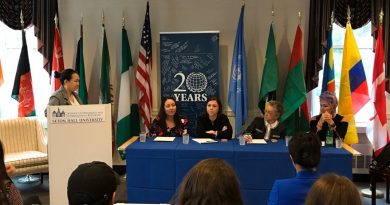The Center for Foreign Policy Studies Visits the School of Diplomacy
Erin Araneta
Staff Writer
On Friday, April 4 at noon in the Diplomacy Room, Seton Hall University’s School of Diplomacy and International Relations students had the opportunity to attend and participate in a discussion with Dr. See Seng Tan of the Center for Foreign Policy Studies, moderated by Professor Ann Marie Murphy. Dr. Tan, who wears many hats including serving as the President and CEO of International Students Inc.; the Research Advisor at the S. Rajaratnam School of International Students; and the Senior Associate at the Centre for Liberal Arts and Social Sciences at Nanyang Technological University, Singapore, discussed Southeast Asia’s engagement with the United States during the first Trump administration, and whether engagement with the second Trump administration will differ. Dr. Tan was charismatic and well-versed in Southeast Asia and U.S. relations, using his expertise to relay his insights and thoughts about the potential effects of the second Trump administration on the region. As one of the leading experts in foreign affairs and the author of 19 books relating to international relations in Southeast Asia, Dr. Tan’s engagement with the School of Diplomacy demonstrates his desire to bridge the academic policy divide, educating and informing students from Singapore to South Orange about the policy issues shaping our world today.
The meeting began with a discussion by Dr. Tan about the overall outlook of the second Trump administration on foreign affairs, especially in Southeast Asia. He stressed President Trump’s unpredictability, transactional nature, and the wide effects of his tariffs, and how these factors would shape the future of U.S. international relations. Dr. Tan noted that Trump was utilizing tariffs as a weapon of equal opportunity; as the region is dependent on international trade, countries would be forced to the negotiating table. Dr. Tan noted that the differences between the two administrations’ U.S.-Southeast Asian relations were not stark, with the first administration beginning a trade war with China, withdrawing from the Trans-Pacific Partnership, and Trump’s lack of involvement in the Association of Southeast Asian Nations (ASEAN). During the second Trump administration, Dr. Tan predicts that Southeast Asian countries may be able to benefit from the Trump administration if they play their cards right, but everything boils down to how useful each country is perceived to be to the U.S. in terms of China.
Dr. Tan highlighted three Southeast Asian countries to monitor during the second Trump administration: the Philippines, Vietnam, and Singapore. For the Philippines, the ever-contentious South China Sea issue sparks curiosity over whether Trump will continue Biden’s support and not appease China. The 17 percent levies on the archipelago nation leaves people wondering about what transpires between Manila and Washington, D.C. at the negotiating table. Vietnam, a strategic partner of the U.S., has been quietly but dramatically expanding island-building efforts in the South China Sea. The country is potentially a good candidate for backing behind the Trump administration, despite its 48 percent pharmaceuticals levy. Singapore’s unique position as a proactive partner of the U.S., but not a formal ally, allows it to play the middleman between the U.S. and the rest of the Southeast Asian region. Dr. Tan closed his discussion by concluding that these countries and others throughout the region may need to be sycophantic towards Trump and build strong personal ties to him to stay in his good graces.
Following Dr. Tan’s talk, the floor was opened for questions. One student asked how Trump’s tariffs will affect the declining perception of the U.S. in Southeast Asia. Dr. Tan responded that even though the region was initially wary of Trump because of his previous job in the region during his first administration, the varying extents of the tariffs were still a shock. He noted that collective bargaining through the Association of Southeast Asian Nations (ASEAN) to push the U.S. government on certain issues may help, despite Trump’s exhibited “lack of patience” for the intergovernmental organization. Dr. Tan also added that Southeast Asian countries can help unpopular members of the Trump administration with the steep learning curve and reciprocate the long years of American support to the region despite the current negative perception towards the administration.
Another student inquired about Trump’s unestablished China policy, especially regarding the South China Sea. Dr. Tan noted that Trump’s lack of articulation for his strategy when dealing with China was a key missing factor in determining Trump’s unstated policy. However, when dealing with China, it is important to establish presence in the region but not upset China enough to create conflict.
One student asked about alternatives or remedies to the tariffs imposed on the trade-dependent region, to which Dr. Tan emphasized a shift in trade patterns in Southeast Asia, with more trade in Europe, increased focus on domestic consumption in China, and generally more trade within Asia itself.


